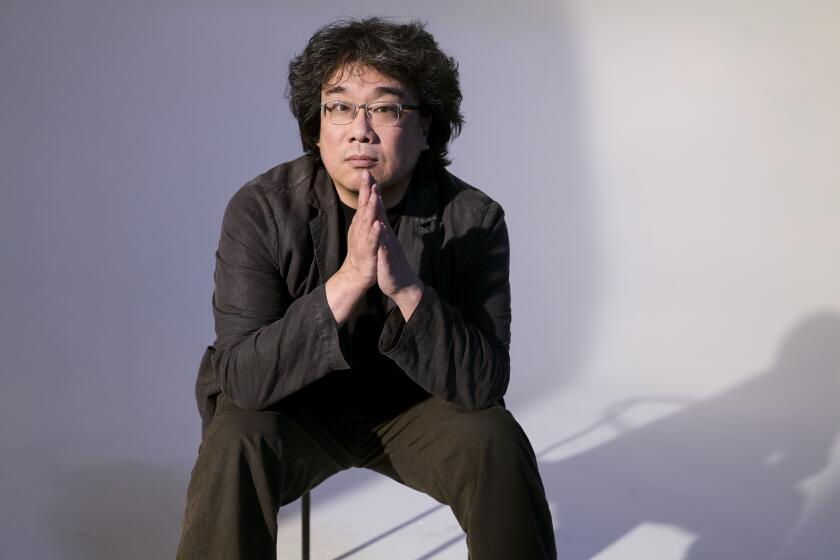‘Passion’ shaping up as Gibson’s lethal weapon
- Share via
Watching Mel Gibson cleverly build interest in his unreleased film on Christ’s execution is like watching an unwholesomely willful child playing with matches.
The immediate temptation may be to let the little brat learn the lesson that burnt fingers will teach. That impulse, however, is quickly overcome -- not only because no decent person stands idly by while pain is inflicted, but also because, if the kid starts a fire, other people may be hurt.
And as the growing controversy over Gibson’s “The Passion” spills more widely onto the nation’s op-ed pages, into political magazines and even into the halls of Congress, more than rhetorical bruises are likely to be suffered.
Even in steady hands, the Passion narrative is as combustible as material can be. Yeats got it about right:
Odour of blood when Christ was slain
Made all Platonic tolerance vain
And vain all Doric discipline.
For nearly 2,000 years, the synoptic Gospels’ account of Christ’s arrest and subsequent execution by soldiers of imperial Rome -- and each of the four Gospels offers a different version -- has retained the power to move believers to extremes of self-sacrifice and hatred. Saints have made it the focus of their spiritual reflection and the well-spring of their self-sacrifice; bigots have made it the engine of their obsessive animosity toward Jews. Millions have died as the result of folkloric or intellectually wicked misreadings of the Passion.
Where on this spectrum does “The Passion,” which Gibson co-wrote, directed and financed with $25 million of his own money, fall?
The answer is unclear, mainly because Gibson has deliberately made it so. But there already is ample reason for suspicion and apprehension for anyone concerned with the renewal of anti-Semitism around the world.
Last March, interviews Gibson gave during the film’s production in Italy led officials of the United States Conference of Catholic Bishops and the Anti-Defamation League of B’nai B’rith to ask a group of nine leading scholars -- five Catholics and four Jews -- to read a copy of the movie’s script that had come into their possession. The organizations previously have cooperated to assist Europeans who wished to revise local Passion plays dating to the Middle Ages to eliminate anti-Semitic provocations.
What the Catholic scholars say they found when they read Gibson’s script was a repetition of the old deicide libel.
“When we read the screenplay, our sense was that this wasn’t really something you could fix,” Sister Mary C. Boys, a professor at Union Theological Seminary, told the New York Times last week. “All the way through, the Jews are portrayed as bloodthirsty. We’re really concerned that this could be one of the great crises in Christian-Jewish relations.”
Father John T. Pawlikowski, professor of social ethics and director of the Catholic-Jewish Studies program at Chicago’s Catholic Theological Union, called the script “one of the worst things we have seen in describing responsibility for the death of Christ in many, many years.”
In an article for the current New Republic, another panelist -- Paula Fredriksen, the Aurelio Professor of Scripture at Boston University -- wrote that the entire group was “shocked” by the script’s recapitulation of calumnies from the worst of the medieval Passion Plays.
The scholars sent Gibson’s Icon productions a letter expressing their concern. When accounts of their reaction leaked into the press, Gibson threatened to sue the scholars and the Catholic bishops. When representatives of the ADL asked to see a cut of film, they were rebuffed.
In the weeks since, Gibson has screened a cut of the film with subtitles -- the dialogue is in Aramaic and Latin, though the Roman soldiers who crucified Christ spoke Greek -- for carefully selected audiences whose members have signed confidentiality agreements. Among the elect have been right-wing commentators Peggy Noonan, Kate O’Beirne, Linda Chavez and Matt Drudge, Laura Ingram and Rush Limbaugh.
David Kuo, deputy director of the White House Office of Faith-Based and Community Initiatives, attended a screening, as did members of the National Assn. of Evangelicals. Afterward, its president, Ted Haggard, told the Guardian, “There is a great deal of pressure on Israel right now. For Jewish leaders to risk alienating 2 billion Christians over a movie seems short-sighted.”
Nasty stuff, likely to get worse.
But there is more than clever marketing behind Gibson’s coyness. What he and his co-workers need to avoid at all cost are discussions of the religious convictions he has said led him to make the film. The actor often is described as a “devout” or “serious” Catholic. He is not, in fact, a Roman Catholic. He and his family are members of one of the so-called traditionalist splinter group that broke with the Roman Catholic Church over the reforms made by the Second Vatican Council in the early 1960s.
Among the conciliar declarations to which these groups most strenuously object was the church’s formal repudiation of any notion of collective Jewish responsibility for the death of Christ.
These objections are particularly strong among American traditionalists, many of whom continue to be infected by the notions of the rabidly anti-Semitic Boston Jesuit Leonard Feeney, who was excommunicated in 1953 by Pope Pius XII for preaching heresy.
Traditionalists, like Gibson, continue to maintain the old doctrine of supercessionism, that is, the belief that the New Testament supplanted the Old as the foundation of true faith. Here, for example, is a quote from one of the most popular Web sites among American traditionalists -- one the author offers as proof of the Catholic Church’s apostasy since the council:
“The constant teaching of the church is that the New Covenant supercedes the Old, but Cardinal Walter Kasper, speaking as the papally appointed President of the Pontifical Council for Religious Relations with the Jews, declared ‘the old theory of substitution is gone since the Second Vatican Council. For us Christians today, the covenant with the Jewish people is a living heritage, a living reality.... Therefore, Judaism, i.e., the faithful response of the Jewish people to God’s irrevocable covenant is salvic for them, because God is faithful to his promises.’ ”
Meanwhile, Gibson maintains an equally studied silence about the views of his father, Hutton, a well-known traditionalist “theologian,” who also happens to be a Holocaust denier and “sedevacantist,” (“the seat is empty” in Latin), who believes there has been no pope since the conclave that elected John XXIII was subverted by a Jewish/Masonic conspiracy.
You can’t make this sort of stuff up.
Perhaps the evangelicals and others rushing to endorse Gibson’s film before its scheduled Ash Wednesday release might want to consider that most of the filmmakers’ fellow traditionalists also still hold to Feeney’s doctrine of extra ecclesiam nulla salus (outside the church -- his church, that is -- there is no salvation).
In other words, you can give him a blurb for the ad, but you’re still going to hell.
More to Read
Only good movies
Get the Indie Focus newsletter, Mark Olsen's weekly guide to the world of cinema.
You may occasionally receive promotional content from the Los Angeles Times.










